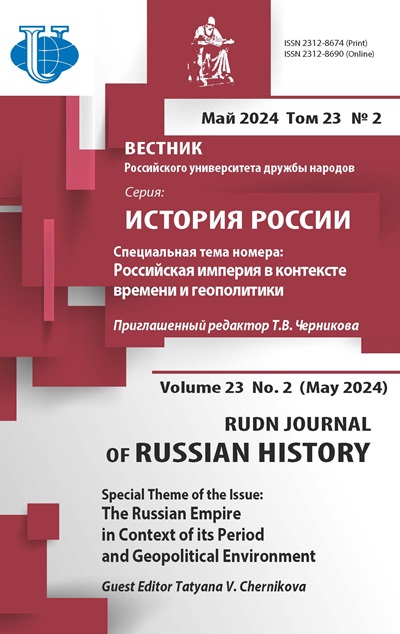ПРОДОВОЛЬСТВЕННАЯ ПОЛИТИКА МИНИСТЕРСТВА ЗЕМЛЕДЕЛИЯ В ПЕРИОД ПЕРВОЙ МИРОВОЙ ВОЙНЫ (ИЮЛЬ 1914 - ФЕВРАЛЬ 1917 г.)
- Авторы: Оськин М.В.1
-
Учреждения:
- Институт законоведения и управления Всероссийской полицейской ассоциации
- Выпуск: Том 16, № 2 (2017)
- Страницы: 190-209
- Раздел: РОССИЯ НА ПУТИ К РЕВОЛЮЦИИ
- URL: https://journals.rudn.ru/russian-history/article/view/16655
- DOI: https://doi.org/10.22363/2312-8674-2017-16-2-190-209
Цитировать
Полный текст
Аннотация
В статье рассматривается продовольственная политика России в период Первой мировой войны. Эта политика имела главной целью снабжение фронта продуктами питания и фуражом. Однако постепенно составной частью этой политики стало обеспечение продовольствием и тыла всей страны. В 1914-1915 гг. продовольственная организация России фактически отвечала только за снабжение действующей армии. С конца 1915 г. начинают вводиться твердые цены на различные продукты и приходится думать о тыловых потребителях. С середины 1916 г. продовольственная ситуация резко ухудшается, что вынудило правительство озаботиться снабжением не только фронта, но и тыла. Объективные недостатки государственной системы власти пытались восполнить организацией продовольственных усилий.
Об авторах
Максим Викторович Оськин
Институт законоведения и управления Всероссийской полицейской ассоциации
Автор, ответственный за переписку.
Email: maxozv@yandex.ru
к.и.н., доцент кафедры общих гуманитарных и социально-правовых дисциплин Института законоведения и управления Всероссийской полицейской ассоциации
300028, Россия, Тула, ул. Сурикова, 2Список литературы
- Булдаков В.П. Красная смута: Природа и последствия революционного насилия. М.: РОССПЭН, 2010.
- Бухараев В.М., Люкшин Д.И. Российская смута начала XX века как общинная революция // Историческая наука в меняющемся мире. Казань, 1994. Вып. 2. С. 154-157.
- Бухараев В.М., Люкшин Д.И. Крестьяне России в 1917 году. Пиррова победа «общинной революции» // 1917 год в судьбах России и мира. Октябрьская революция: от новых источников к новому осмыслению. М.: ИРИ РАН, 1998. С. 131-142.
- Земский феномен: политологический подход. Саппоро, 2001.
- МироновБ.Н. Российская империя: от традиции к модерну. СПб.: Дмитрий Буланин, 2014-2016. В 3 томах.
- Давыдов М.А. Двадцать лет до Великой войны: российская модернизация Витте -Столыпина. М.: Алетейя, 2016.
- Островский А.В. Российская деревня на историческом перепутье. Конец XIX - начало XX в. М.: Товарищество научных знаний КМК, 2016.
- Анфимов А.М. Российская деревня в годы Первой мировой войны. М.: Соцэкгиз, 1962.
- Воронов И.И. Министерство земледелия Российской империи: XIX - начало XX в. Красноярск: Литера-Принт, 2013.
- Сенин А.С. Железнодорожный транспорт России в эпоху войн и революций (1914-1922 гг.). М.: Транспортная книга, 2009.
- Сидоров А.Л. Экономическое положение России в годы Первой мировой войны. М.: Наука, 1973.
- Тагирова Н.Ф. Рынок Поволжья (вторая половина XIX - начало XX вв.). М.: Издательский центр научных и учебных программ, 1999.
- Роднов М.И. Пространство хлебного рынка (Уфимская губерния в конце XIX - начале XX вв.). Уфа: ДизайнПресс, 2012.
- Россия в годы Первой мировой войны. 1914-1918: материалы Международной научной конференции / Отв. ред. А.Н. Артизов, А.К. Левыкин, Ю.А. Петров. М.: ИРИ РАН, 2014.
- Россия и Первая мировая война: экономические проблемы, общественные настроения, международные отношения / Сост. С.М. Исхаков. М.: ИРИ РАН, 2014.
- Россия в годы Первой мировой войны: экономическое положение, социальные процессы, политический кризис / Отв. ред. Ю.А. Петров. М.: РОССПЭН, 2014.
- Наумов А.Н. Из уцелевших воспоминаний. 1868-1917. Нью-Йорк: Изд. А.К. Наумовой и О.А. Кусевицкой, 1955.
- Lih Lars T Bread and Authority in Russia, 1914-1921. Berkeley, Б.и. 1990.
- Борисов В.И., Чернобаев А.А. Хлеб, война, революция: Продовольственная политика на Юге России в период первой мировой войны и революции (1914-1918). М.-Луганск: ЛСХИ, 1997.
- Букшпан Я.М. Военно-хозяйственная политика. М.-Л.: РАНИОН, 1929.
- Оськин М.В. Командования фронтов зимой 1917 г. в борьбе с кризисом продовольственного снабжения действующей армии // Вестник Российского университета дружбы народов. Серия: История России. 2015. № 4. С. 24-33.
- Geoffrey J. The First World War (1): The Eastern Front 1914-1918. Essential Histories 13, Osprey Publishing, 2002.
- Holquist P. Making war, forging revolution: Russia's continuum of crisis, 1914-1921. Cambridge: Harvard University Press, 2002.
- Китанина Т.М. Война, хлеб и революция. (Продовольственный вопрос в России. 1914 - октябрь 1917 г.). Л.: Наука, 1985.
- Китанина Т.М. Россия в Первой мировой войне 1914-1917 гг.: экономика и экономическая политика. Курслекций. СПб.: Гуманитарная академия, 2016.
- Yaney G.-L. The Urge to Mobilize: agrarian reform in Russia, 1861-1930. Urbana: University of Illinois Press, 1982.
- Государственный архив Российской Федерации (ГА РФ). Ф. 1779; 1797; 6831; 6831. Журналы Особого Совещания по обороне государства. М., 1978. Вып. 2
- Записка о производстве массовых заготовок продуктов продовольствия и фуража для армии и населения. М., 1915.
- Российский государственный военно-исторический архив (РГВИА). Ф. 499. Российский государственный исторический архив (РГИА). Ф. 381. Оп. 46. Д. 204
















